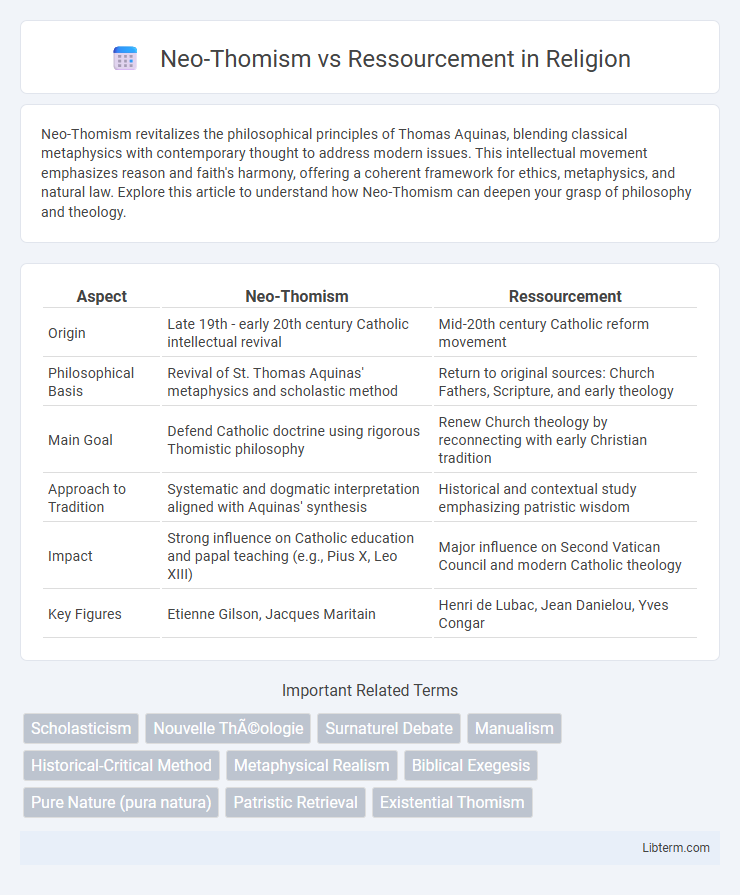Neo-Thomism revitalizes the philosophical principles of Thomas Aquinas, blending classical metaphysics with contemporary thought to address modern issues. This intellectual movement emphasizes reason and faith's harmony, offering a coherent framework for ethics, metaphysics, and natural law. Explore this article to understand how Neo-Thomism can deepen your grasp of philosophy and theology.
Table of Comparison
| Aspect | Neo-Thomism | Ressourcement |
|---|---|---|
| Origin | Late 19th - early 20th century Catholic intellectual revival | Mid-20th century Catholic reform movement |
| Philosophical Basis | Revival of St. Thomas Aquinas' metaphysics and scholastic method | Return to original sources: Church Fathers, Scripture, and early theology |
| Main Goal | Defend Catholic doctrine using rigorous Thomistic philosophy | Renew Church theology by reconnecting with early Christian tradition |
| Approach to Tradition | Systematic and dogmatic interpretation aligned with Aquinas' synthesis | Historical and contextual study emphasizing patristic wisdom |
| Impact | Strong influence on Catholic education and papal teaching (e.g., Pius X, Leo XIII) | Major influence on Second Vatican Council and modern Catholic theology |
| Key Figures | Etienne Gilson, Jacques Maritain | Henri de Lubac, Jean Danielou, Yves Congar |
Introduction to Neo-Thomism and Ressourcement
Neo-Thomism revives the philosophical and theological principles of Thomas Aquinas, emphasizing rational inquiry and metaphysical realism rooted in Aristotelian-Thomistic tradition. Ressourcement, emerging in the mid-20th century, advocates a return to the original sources of Christian theology, including the Church Fathers, to renew modern thought and liturgy. Both movements engage deeply with historical theology but differ in methodology: Neo-Thomism prioritizes systematic philosophical rigor, while Ressourcement emphasizes historical-critical renewal of tradition.
Historical Origins and Development
Neo-Thomism emerged in the late 19th and early 20th centuries as a revival of Thomas Aquinas' philosophical and theological ideas, aiming to address modern intellectual challenges within Catholic doctrine. Ressourcement developed in the mid-20th century, originating from a return to the original sources of Christian theology, including the Church Fathers and Scripture, as a response to perceived rigidity in Neo-Thomism. The historical development of Neo-Thomism emphasized systematic scholasticism, while Ressourcement fostered renewal through historical-critical methods and ecumenical engagement.
Key Philosophical Foundations
Neo-Thomism emphasizes the revival of Thomas Aquinas's metaphysical realism and natural law theory, asserting a clear distinction between nature and grace based on scholastic Aristotelian principles. Ressourcement prioritizes a return to the original sources of Christian tradition, including patristic writings and Scripture, advocating for a historical and existential interpretation that integrates faith with contemporary human experience. The fundamental difference lies in Neo-Thomism's systematized, rationalist approach versus Ressourcement's dynamic, context-sensitive engagement with tradition and theology.
Core Theological Differences
Neo-Thomism emphasizes the systematic revival of St. Thomas Aquinas's metaphysical and epistemological frameworks, focusing on adherence to scholastic methods and the natural law tradition. Ressourcement prioritizes a return to original sources of Christian theology, especially patristic texts, advocating for a dynamic, historically grounded renewal of doctrine that engages modern existential questions. Core theological differences lie in Neo-Thomism's fixed scholastic rigor versus Ressourcement's emphasis on historical context and pastoral adaptation, shaping contrasting approaches to revelation, grace, and the interpretation of Scripture.
Influential Figures in Neo-Thomism
Influential figures in Neo-Thomism include Etienne Gilson and Jacques Maritain, who revived Thomistic philosophy by emphasizing metaphysical realism and integration with modern science. Gilson's work highlighted the historical development of Thomism, reinforcing its foundational role in Catholic intellectual tradition. Maritain contributed by adapting Aquinas's ideas to contemporary political and ethical issues, promoting a synthesis of faith and reason within modern society.
Prominent Proponents of Ressourcement
Prominent proponents of Ressourcement include theologians like Henri de Lubac, Yves Congar, and Jean Danielou, who sought to renew Catholic theology by returning to the original sources of Scripture and Church Fathers. Their approach contrasted with Neo-Thomism's strict adherence to Thomistic philosophy and scholastic methods, emphasizing instead historical context and biblical exegesis. Ressourcement significantly influenced the Second Vatican Council, reshaping modern Catholic thought through a more dynamic and pastoral theology.
Methodological Approaches Compared
Neo-Thomism emphasizes a systematic, scholastic method rooted in the works of St. Thomas Aquinas, prioritizing logical coherence, metaphysical principles, and deductive reasoning. Ressourcement advocates a return to original patristic sources using a historical-critical approach, stressing the dynamic, lived context of early Christian theology and a more dialogical, interpretive method. The methodological contrast lies in Neo-Thomism's deductive, text-centered framework versus Ressourcement's hermeneutical, historical renewal aimed at revitalizing contemporary theological discourse.
Impact on Catholic Doctrine and Practice
Neo-Thomism reinforced traditional Catholic doctrine by emphasizing Aristotelian metaphysics and Scholastic method, providing a systematic foundation for theology and moral teaching. Ressourcement sought renewal by returning to early Church Fathers, promoting a more historical and spiritual interpretation that influenced Vatican II's aggiornamento and liturgical reforms. The dynamic between Neo-Thomism's rigor and Ressourcement's pastoral approach shaped contemporary Catholic theology, balancing doctrinal continuity with pastoral adaptation.
Contemporary Relevance and Critiques
Neo-Thomism emphasizes a systematic revival of Aquinas' metaphysical principles, maintaining strong roots in classical theology to address contemporary ethical and philosophical questions with rigor and clarity. Ressourcement prioritizes returning to the original sources of Christian tradition, particularly the Church Fathers, fostering a dynamic and historically informed theology that resonates with modern existential and pastoral concerns. Critics of Neo-Thomism argue it can be overly rigid and disconnected from modern contexts, while Ressourcement faces critiques for potentially relativizing doctrinal consistency in favor of historical interpretation and pastoral adaptability.
Conclusion: Ongoing Dialogue and Legacy
Neo-Thomism and Ressourcement continue to influence contemporary theological discourse by fostering a rich, ongoing dialogue that bridges scholastic rigor with historical renewal. The legacy of Neo-Thomism lies in its systematic defense of Aristotelian-Thomistic philosophy, while Ressourcement revitalizes patristic sources to address modern existential questions. Their interplay shapes modern Catholic theology, encouraging both continuity and innovation in understanding faith and reason.
Neo-Thomism Infographic

 libterm.com
libterm.com